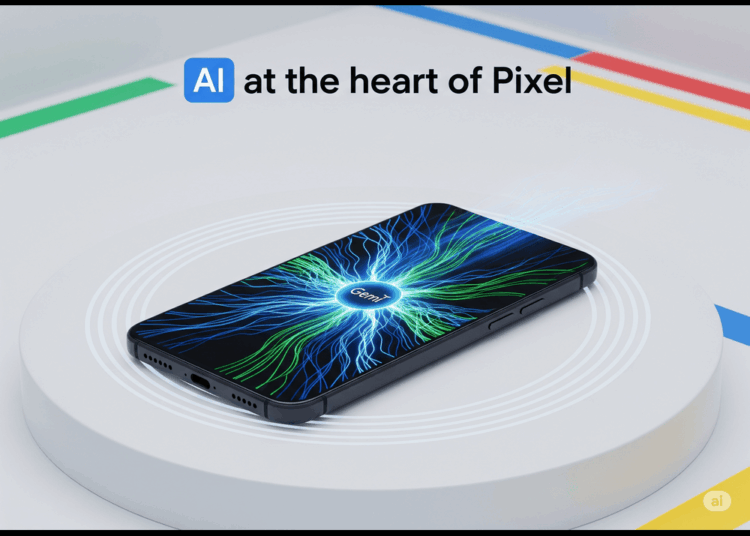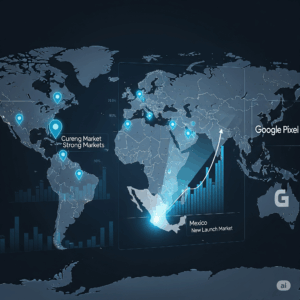Google has unveiled its latest Pixel smartphone lineup with a clear message: the future of mobile technology lies in AI-powered smartphones rather than radical hardware redesigns. At the annual “Made by Google” event in New York, the company presented new Pixel devices, wearables, and accessories, but placed artificial intelligence front and center in both messaging and functionality.
Unlike previous years where hardware leaps dominated, this year’s showcase leaned heavily on Google’s AI model Gemini and its integration across devices. The event had a consumer-friendly tone, featuring celebrities such as Jimmy Fallon and the Jonas Brothers demonstrating real-world AI use cases.
AI-Powered Smartphones Take the Spotlight
Google’s senior vice president of devices and services, Rick Osterloh, emphasized that Gemini represents a significant leap in making phones more intuitive. “There has been a lot of hype about AI in phones, and frankly a lot of broken promises too,” he said. “But Gemini is the real deal.”
The Pixel 10 series introduces several AI-driven features, including:
-
Camera Coach: An AI assistant that guides users to take better photos.
-
Proactive Assistant: Surfaces useful information without prompts—for example, displaying flight details when calling an airline.
-
Real-Time Translation: AI-powered phone call translation, first teased at Google I/O.
While the phone design remains largely unchanged, a new telephoto lens has been added to the base model, narrowing the gap with higher-end versions.
Modest Hardware Updates with Pixelsnap Charging
From a hardware perspective, the Pixel 10, Pixel 10 Pro, Pixel 10 Pro XL, and Pixel 10 Pro Fold come equipped with Google’s latest Tensor G5 processor. The big physical update is Pixelsnap, a magnetic charging technology similar to Apple’s MagSafe. Google also introduced a line of Pixelsnap-compatible chargers, cases, and stands.
Prices remain consistent with last year’s lineup:
-
$799 for the base Pixel 10
-
$1,799 for the foldable Pixel 10 Pro Fold
Despite concerns earlier this year about tariffs potentially pushing smartphone prices higher, Google kept pricing steady.
Alongside smartphones, the company introduced the Pixel Watch 4 and Pixel Buds 2a, though the premium Pixel Buds Pro 2 received only cosmetic updates and upcoming software features.
Market Share Challenges for AI-Powered Smartphones
Despite Google’s advances in AI integration, its Pixel brand continues to struggle in terms of global smartphone sales. According to IDC, Google held only 1.1% of worldwide smartphone market share in Q2 2025, up slightly from 0.9% a year earlier. In the United States—Pixel’s biggest market—share fell from 4.5% to 4.3%.
Google’s focus has remained on premium markets, with nearly three-quarters of its shipments concentrated in the United States, Japan, and the UK. Analysts note that limited geographical reach has stunted growth compared to competitors like Samsung and Xiaomi.
To address this, Google announced that the Pixel 10 series will be available in Mexico for the first time, signaling a possible broader global expansion strategy.
Marketing Over Hardware: A Strategic Shift
Industry analysts highlighted that this year’s launch felt less about hardware breakthroughs and more about positioning Google as the leader in AI-powered smartphones.
“Last year there was such a big jump in design and features,” said Carolina Milanesi of Creative Strategies. “This year feels more like a marketing push, emphasizing AI experiences.”
Bob O’Donnell of Technalysis Research added that many AI functions could likely run on last year’s Pixel hardware, suggesting Google’s focus is on creating a unified AI ecosystem rather than driving sales through physical upgrades.
The Road Ahead for Google AI Smartphones
With Apple set to release its next iPhones this autumn—reportedly with more modest AI features than previously promised—Google is positioning itself as the company most committed to building a universal AI assistant across devices.
Whether this strategy translates into significant market share growth remains uncertain. For now, Google is banking on consumer interest in practical AI functions, hoping its AI-powered smartphones can differentiate Pixel in a crowded market.
The Pixel 10 series launches later this month, with the Pixel 10 Pro Fold shipping in October.
Stay ahead of the curve on AI-powered smartphones and tech innovation by following IMPAAKT, your go-to top business magazine for global business insights.













